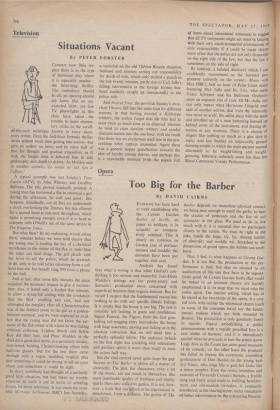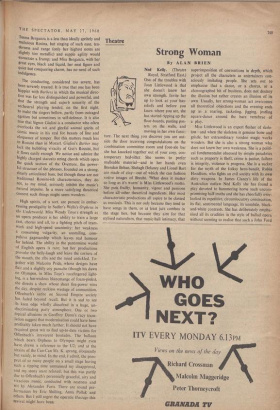Opera
Too Big for the Barber
By DAVID CAIRNS EVERYONE has been hard at work establishing why the Covent Garden Barber of Seville, on paper so brilliant, is in actuality so compara- tively subdued. This is clearly no common or Garden case of perfunc- toriness and muddle; the elements have been put together with care.
Analysis has found that what is wrong is that while Giulini's con- ducting is too serious and masterful, Jean-Denis Malcles's settings are too pretty-pretty and Sarrazin's production more concerned with superficial business than organic humour. But for myself I suspect that the fundamental reason has nothing to do with any specific artistic failings. It is simply that the house is too big. The cast is certainly not lacking in gusto and confidence; Signor Panerai, the Figaro, from his first gam- bolling tail-wagging entry buttonholes the house with huge assurance, pawing and licking us in the absolute conviction that we will think him a perfectly splendid fellow. The audience (which on the first night was crackling with enthusiasm and partisan spirit) is more than ready to meet the actors half way.
But the vital current never quite leaps the gap. Success in The Barber is above all a matter of electricity. The plot, the characters, even a lot of the music, are not much in themselves. But some indefinable quality of freshness and vitality sparks them into collective genius. It is riot, how- ever, a work that can afford to be experienced in detachment, from a distance. The genius of The Barber depends on immediate, physical contact, on being near enough to smell the garlic, to hear the crackle of petticoats and the fizz of asti spumante in the glass. We need to be in live touch with it; it is essential that we participate closely in the action. We must be right in the joke, inside the huge, sly, fat, shining bubble of absurdity and worldly wit. Stretched to the dimensions of grand opera, the bubble can easily burst.
That, I feel, is what happens at Covent Gar- den. It is not that the production or the per- formance is bad, but that to succeed in an auditorium of this size they have to be superla- tively good. At Covent Garden faults that would be venial in an intimate theatre are harshly emphasised. It is on stage that we most miss the comic spirit. The interior setting, which has to be stared at for two-thirds of the opera, is a cosy red boite with neither the whimsical charm (such as some of the costumes have) nor the funda- mental realism which are both essential to Rossini. The production is only genuinely funny in spasms. Figaro embellishing a public announcement with a rapidly pencilled face is a rare stroke of humour, and it is immediately spoiled when he proceeds to tear the poster down. Luigi Alva as the Count has some good moments of sly comedy; on the other hand the producer has failed to impose the cavernous, crumbling grotesquerie of Don Basilio on the young bass No Vinco, who sings like a god but looks like a minor prophet. Even the comic invention and restraint of Fernando Corena's Bartplo, a fruitily sung and finely acted study in bullfrog bewilder- ment and old-maidish irritation, is eventually smothered, in the shaving scene, under mountains of lather administered by the exhausting Panerai. Teresa Berganza is a less than ideally spritely and malicious Rosina, but singing of such ease, ten- derness and range (only her highest notes are slightly too metallic) and supple agility would exonerate a frump; and Miss Berganza, with her great eyes, black and liquid, her neat figure and quiet but conquering charm, has no need of such indulgence.
The conducting, considered too severe, has been severely treated. It is true that one has been happier with Barbers in which the musical direc- tion was far less distinguished and powerful, and that the strength and superb sonority of the orchestral playing tended. on the first night, to make the singers bellow, partly from outraged egotism but sometimes in self-defence. It is also true that Signor Giulini is a conductor who often overlooks the wit and gleeful animal spirits of comic music in his zeal for beauty of line and eloquence of temper. But this matters much less in Rossini than in Mozart. Giulini's Barber may lack the bubbling vivacity of Gui's Rossini, but It flows easily enough We notice and admire the highly charged staccato string chords which open the quick section of the Overture, the power- ful structure of the phrases, founded on a strong. clearly articulated bass: but though these are not traditional Rossini-ish characteristics, they do not, to my mind, seriously inhibit the music's natural impulse. In a more satisfying theatrical context such things might seem wonders.
High spirits, of a sort, are present in embar- rassing prodigality in Sadler's Wells's Orpheus in the Underworld. Miss Wendy Toye's strength as an opera producer is hey ability to train a large cast, chorus and all, to a fighting pitch of team- work and high-speed unanimity: her weakness a consuming vulgarity, an unsmiling, com- pulsive gagmanship which leaves real humour far behind. The ability in the pantomime world of English opera is rare; but her productions provoke the belly-laugh and leave the corners of the mouth, the ribs and the mind untickled. To- gether with Malcolm Pride, whose designs have flair and a slightly coy panache (though his dawn on Olympus, in Miss Toye's rosyfingered light- ing, is a horrendous blancmange of foam-pinks), she directs a show whose sheer fire-power wins the day, despite reckless wastage of ammunition. Offenbach's satire on Second Empire society has faded beyond recall. But it is sad to see its keen edge wholly dissolved in a huge, un- discriminating party atmosphere. One or two topical allusions in Geoffrey Dunn's racy trans- lation suggest that modernisation could have been Profitably taken much farther. It should not have required great wit to find up-to-date victims for Offenbach's irreverent boutades. The balloon which bears Orpheus to Olympus might even have drawn a reference to the U2; and at the strains of the Can-Can Mr. K. sprang, eloquently but vainly, to mind. In the end, I admit, the pros- pect of so many people on a small stage having such a ripping time unmanned my disapproval, and my stony stare relaxed; but this was partly due to Offenbach's perennially graceful, airy and vivacious music, conducted with neatness and wit by Alexander Faris. There are sound per- formances by Eric Shilling, Anna Pollak and others. But I still regret the operatic Hostage this revival might have been.







































 Previous page
Previous page